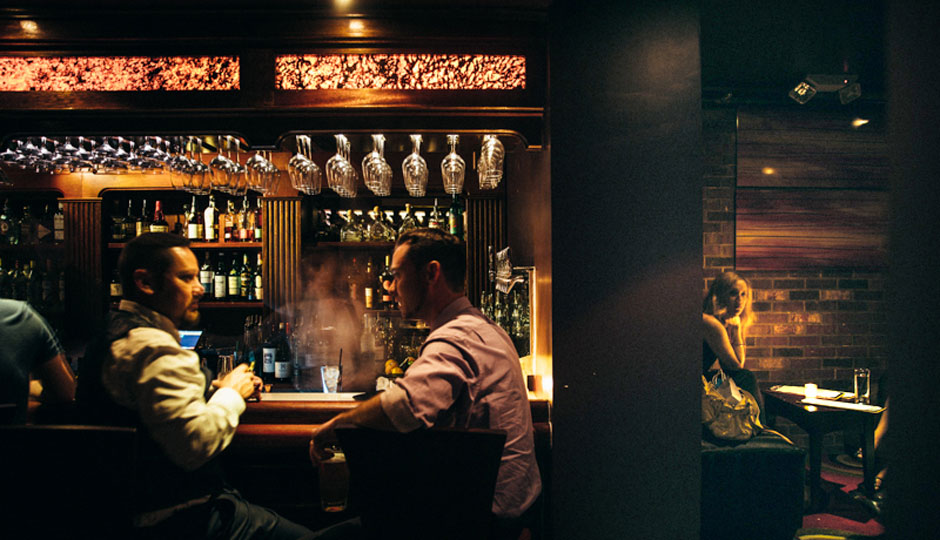Restaurant Review: Vesper

Vesper Bar | Photo by Neal Santos
Two men walk into a bar.
“May we go downstairs?” one asks, gesturing toward a bookcase that conceals a secret stairwell.
“Do you have the password?” the hostess replies, flashing a flinty sidelong stare.
And there they all stand: three strangers at an engineered impasse, looking at a black rotary phone mounted on a nearby wall.
Is this what we’ve come to? Is our Prohibition nostalgia so acute that we have to reenact it for the sake of a daiquiri? It’s 2015. You’d think a self-styled speakeasy would reserve the cloak-and-dagger for stiffer stuff. If you’re asking barflies for passwords, shouldn’t you be garnishing their Tanquerays with fat spliffs of chronic?
It being really awkward for three people to stand wordlessly in the foyer of a public restaurant, the hostess waited only a split second to shift from faux seriousness to bubbly enthusiasm. “Just pick up the phone and say ‘overproof ’!” she exclaimed, whereafter something clicked inside the wall and the bookcase swung open.
We had to pause halfway down the stairs to stifle our laughter.
It is perhaps unfair, though, to pick on Vesper for its strained speakeasy element. After all, this restaurant has so many other themes that you might never even suspect Basement Grotto With an R&B Groove was one of them.
The original Vesper Club was chartered in 1901 by Mummers looking for a way to end-run the Sunday prohibition on alcohol service. In 1941 it became a private dining club where Frank Rizzo and Mob boss Angelo Bruno broke bread—though not necessarily together. For its third incarnation, owners Brendan Smith, John Barry and Chuck Ercole have raided every restaurant trend on the cusp of its 16th minute of fame, thrown them all into one can, and shaken vigorously.
There are small plates. There are big steaks. There are toasts with elaborate toppings. There’s fancy grilled cheese. Pork belly, that old-new darling, shares menu space with a wedge salad and potpie, the latest in Mad Men-era nostalgia.
You can catch a hot jazz combo. Or a bluegrass quartet, or a solo singer-songwriter, or a deejay—or, if you have my luck, a soft-rock cover band belting out “Drift Away.”

Scallops at Vesper
Unfortunately, all these crossed signals (of mood, of style, of inspiration) detracted from cooking that hits more often than it misses. Ken Wallace, an Irish journeyman with experience in Michelin-starred kitchens, has mounted a laudable mixture of traditional refinement and fleet-footed seasonality.
Spring brought a mild lamb loin with English peas and mushrooms—which were soon exchanged for a deconstructed ratatouille during the heat of early June. A soothing, artichoke-inflected plate of scallops and pork belly likewise shifted into a more refreshing gear, dropping the swine in favor of a sweet-tart cherry reduction and jellied clumps of almond-milk panna cotta.
The well-charred crust of a thick-cut Chateaubriand disguised an explosion of juiciness. But the cleverness of an accompanying shallot tarte tatin was undermined by a cloying overdose of butterscotch caramel. A few dishes erred on the side of richness. Wallace’s seasonal potpie would have sung more clearly of spring had the ratio of cream to fava beans and mushrooms been flipped. And crab mounded high on one of those toasts was cut too thickly with rémoulade for my druthers. But a fine raw bar provided safe harbor, as did a cured-salmon ballotine gussied up with (but not overwhelmed by) pine-scented crème fraîche.
Service was a bigger concern. No sooner was an amuse resembling two short pints of beer delivered than its bearer fled, having forgotten what they were. (In his defense, he did return—and anyway, watermelon gazpacho topped with parmesan foam is perhaps an idea best left forgotten.) Wine ordered to go along with my steak only arrived in time to be a chaser. Yet it seemed the support staffers were being paid a commission for each dish they cleared, so eager were they to remove plates that still contained food.
But then, maybe they were simply as confused by Vesper’s atmosphere as I was. As good as Wallace’s food was, the restaurant itself is a paradox: an establishment that feels like it’s in search of a purpose even as it tries to serve too many different ones at once.
One Star – Fair
Vesper [Foobooz]


